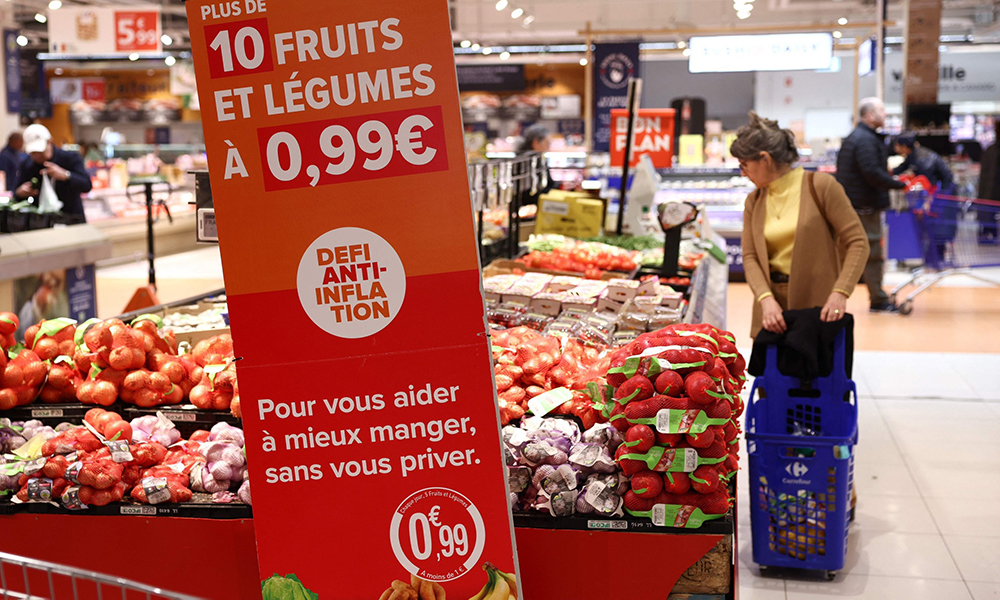
家乐福(Carrefour)与百事公司(PepsiCo)的争端升级。法国食品杂货巨头家乐福不再满足于像2023年秋天一样,仅仅标注百事公司“缩水式通胀”的商品。所谓“缩水式通胀”是指在价格不变、甚至上涨的情况下,商品包装内的容量减少。从1月4日开始,该连锁超市在四个国家的店内挂出了“无法接受的涨价”的标志,意在告诉这些国家的购物者,家乐福超市停止出售百事公司的商品。
从上周开始,家乐福在法国、意大利、西班牙和比利时执行这些调整,这意味着消费者将更难找到奇多(Cheetos)、多力多滋(Doritos)和桂格(Quaker)燕麦等商品。
但这只是两家大公司之间的最新冲突。2023年9月,家乐福开始在货架上标注过分缩水式通胀的商品,主要目标便是百事公司。标签上写道:“该商品容量或重量减少,但供应商实际价格上涨。”
食品杂货批发协会(Institute of Grocery Distribution)的首席经济学家詹姆斯·沃顿认为,将商品下架是“最后的手段”,他对路透社(Reuters)表示:“如果人们想要购买的商品被下架,最终结果将是两败俱伤。”
但家乐福的做法得到了欧洲各国政府的支持。政府一直在说服大公司降价,以应对通货膨胀。
家乐福的首席执行官亚历山大·邦帕德曾经在2023年表示,尽管原材料成本下降,但消费品公司却拒绝配合降价。法国财政部部长布鲁诺·勒梅尔认同他的观点,并特别提到了百事公司、联合利华(Unilever)和雀巢(Nestlé)。
勒梅尔在2023年4月说:“当物价上涨时,各公司马上涨价,但当小麦降价时,意大利面的价格却在三个月后才下调,这让我不能理解。这是不可接受的。”他警告称:“我会尽我所能,保证大型实业公司同意降价。”
据路透社报道,法国政府已经要求零售商和供应商在今年1月完成年度价格谈判,比以往提前了几个月时间。法国通过一种不同寻常的做法保护农户,即强制超市每年只能进行一次价格谈判,2023年的价格谈判恰逢高通胀期间。
标注“缩水式通胀”商品的目的是让供应商重新考虑其定价政策,但从家乐福上周的动作来看,这在百事公司身上并没有产生效果。家乐福并非唯一一家在欧洲表明立场的连锁超市。其比利时竞争对手克鲁特(Colruyt)表示,由于价格分歧,该公司将停止销售亿滋国际[Mondelez,奥利奥(Oreos)和费城奶油奶酪(Philadelphia cream cheese)的生产商]的商品。据路透社报道,该食品杂货零售商称,随着能源和原材料价格的下降,涨价已经没有合理的理由。(财富中文网)
译者:刘进龙
审校:汪皓
家乐福(Carrefour)与百事公司(PepsiCo)的争端升级。法国食品杂货巨头家乐福不再满足于像2023年秋天一样,仅仅标注百事公司“缩水式通胀”的商品。所谓“缩水式通胀”是指在价格不变、甚至上涨的情况下,商品包装内的容量减少。从1月4日开始,该连锁超市在四个国家的店内挂出了“无法接受的涨价”的标志,意在告诉这些国家的购物者,家乐福超市停止出售百事公司的商品。
从上周开始,家乐福在法国、意大利、西班牙和比利时执行这些调整,这意味着消费者将更难找到奇多(Cheetos)、多力多滋(Doritos)和桂格(Quaker)燕麦等商品。
但这只是两家大公司之间的最新冲突。2023年9月,家乐福开始在货架上标注过分缩水式通胀的商品,主要目标便是百事公司。标签上写道:“该商品容量或重量减少,但供应商实际价格上涨。”
食品杂货批发协会(Institute of Grocery Distribution)的首席经济学家詹姆斯·沃顿认为,将商品下架是“最后的手段”,他对路透社(Reuters)表示:“如果人们想要购买的商品被下架,最终结果将是两败俱伤。”
但家乐福的做法得到了欧洲各国政府的支持。政府一直在说服大公司降价,以应对通货膨胀。
家乐福的首席执行官亚历山大·邦帕德曾经在2023年表示,尽管原材料成本下降,但消费品公司却拒绝配合降价。法国财政部部长布鲁诺·勒梅尔认同他的观点,并特别提到了百事公司、联合利华(Unilever)和雀巢(Nestlé)。
勒梅尔在2023年4月说:“当物价上涨时,各公司马上涨价,但当小麦降价时,意大利面的价格却在三个月后才下调,这让我不能理解。这是不可接受的。”他警告称:“我会尽我所能,保证大型实业公司同意降价。”
据路透社报道,法国政府已经要求零售商和供应商在今年1月完成年度价格谈判,比以往提前了几个月时间。法国通过一种不同寻常的做法保护农户,即强制超市每年只能进行一次价格谈判,2023年的价格谈判恰逢高通胀期间。
标注“缩水式通胀”商品的目的是让供应商重新考虑其定价政策,但从家乐福上周的动作来看,这在百事公司身上并没有产生效果。家乐福并非唯一一家在欧洲表明立场的连锁超市。其比利时竞争对手克鲁特(Colruyt)表示,由于价格分歧,该公司将停止销售亿滋国际[Mondelez,奥利奥(Oreos)和费城奶油奶酪(Philadelphia cream cheese)的生产商]的商品。据路透社报道,该食品杂货零售商称,随着能源和原材料价格的下降,涨价已经没有合理的理由。(财富中文网)
译者:刘进龙
审校:汪皓
Carrefour is taking its spat with PepsiCo up a notch. No longer content to, as it did in the fall, label PepsiCo’s examples of “shrinkflation,” a nasty variant of inflation where the bag gets emptier while the price remains the same, or even increases, now the French grocery giant is doubling down. Starting on January 4 with in-store signs that cite “unacceptable price increases,” the supermarket chain is telling shoppers in four countries that it will no longer carry PepsiCo products.
The changes start last week in France, Italy, Spain, and Belgium, meaning Cheetos, Doritos, and Quaker cereals will suddenly be harder to find there.
But this is just the latest clash between the two behemoths. In September, Carrefour started labeling egregious examples of shrinkflation on its shelves, with PepsiCo a prominent target. The labels read: “This product has seen its volume or weight fall and the effective price from the supplier rise.”
James Walton, chief economist at the Institute of Grocery Distribution, calls delisting a “last resort,” telling Reuters that “nobody wins if the goods that people want are not available on the shelves.”
But Carrefour has on its side European governments, which have been pressuring big companies to lower prices in the battle against inflation.
Carrefour CEO Alexandre Bompard argued last year that consumer goods companies were not cooperating with efforts to cut prices, despite the cost of raw materials falling. French finance minister Bruno Le Maire agreed, pointing a finger at PepsiCo, Unilever, and Nestlé, in particular.
“I don’t see why when prices go up companies pass on the increase immediately, but when the price of wheat falls, the price of pasta takes three months to fall. It’s unacceptable,” Le Maire said last April, warning, “I will use all the powers at my disposal to ensure that the big industrial companies pass on the decrease.”
France’s government has asked retailers and suppliers to finish their yearly price negotiations in January, a few months sooner than usual, Reuters reported. France is unusual in that it protects its farmers by forcing supermarkets to negotiate prices only once a year, and last year prices got locked in amid high inflation.
The shrinkflation campaign aimed to make suppliers rethink their pricing policies, but, judging by Carrefour’s move last week, it fell short with PepsiCo. And Carrefour isn’t the only supermarket chain taking a stand in Europe. Its Belgian rival Colruyt said that price disputes spurred it to stop supplies from Mondelez—the maker of Oreos and Philadelphia cream cheese. As Reuters reported, the grocer noted that with energy and raw material prices falling, rate hikes were no longer justifiable.






